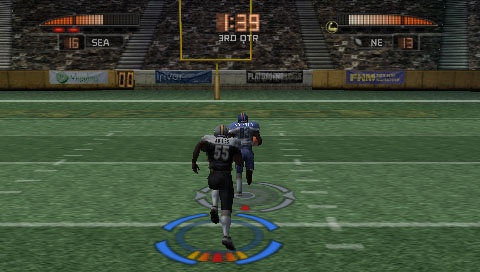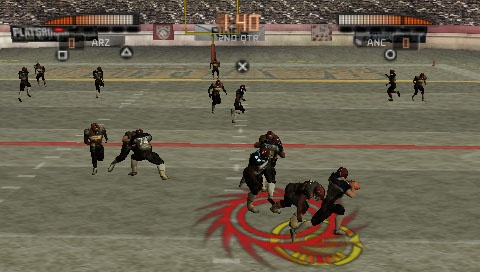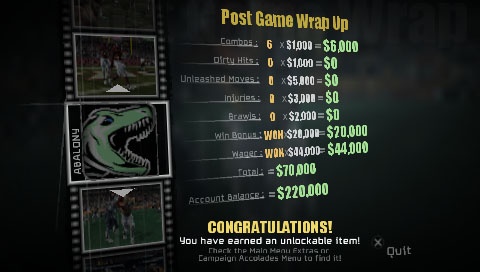Blitz: Overtime is a PSP update to Blitz: The League, which was released last year on the Xbox and PS2, and earlier this year on the Xbox 360. Generally speaking, this is very much the same brand of over-the-top, bloodthirsty football the console games contained, but with more than a few caveats. First of all, the developer clearly couldn't get the game to run at the proper speed on the PSP hardware, no matter how many textures it blurred and lighting effects it removed. Secondly, the load times are just abysmal, lasting only slightly longer than the average pro football player's career. Yes, there's a bit of new content, and yes, the game that lays underneath all these technical gaffes is a fun one, but you'll be hard-pressed to enjoy it in the state it's in on the PSP.

If you ever played the Blitz brand of football in its arcade heyday, the core mechanics of The League will be immediately familiar to you. This is eight-on-eight football with an incredibly quick pace, 30-yard downs, and the kinds of barbarous hits that would snap a typical human being in half. But really, anyone with a basic understanding of football ought to be able to pick up The League's simplistic mechanics quite easily. You still call plays as you would in any football game, and you can run, pass, and tackle at the press of single buttons. Just don't expect any fancy audibles or defensive scheme shifts to be available. You'll call a play, and that's the play you'll run, dammit.
Overtime does futz with the Blitz formula a bit, however, and in quite satisfying ways. As you earn yards and touchdowns on offense, and as you stuff your opponents on defense, you'll build up your team's clash meter. Clash is basically the gamebreaker concept from EA's arcade sports games, but it's done better here. Any time you have any clash built up, you can simply press the left shoulder button to slow down time for everyone on the field except the player you're in control of. Passing the ball while in clash mode will let you take control of the wide receiver, tight end, or whomever else you choose while he's in midroute, letting you shift him to the position he needs to be in to manually catch the ball. Runners can use this mode to shift and juke around would-be tacklers with relative ease. Defenders use clash differently than offensive players, because it doesn't slow down time for them. Essentially, clash lets them lay down the dirtiest, foulest, meanest hits you'll ever see.
These defensive cheap shots will often lead to injuries, which are the best part of the game. Any time you injure an opposing player, the game shifts to an X-ray camera mode, highlighting the portion of the poor schmuck's anatomy you just snapped in two. If it isn't a season-ending injury, you're even given the option of treating it as normal, perhaps leading to the player being out for the entire length of the game. However, if you're the gambling type, you can "juice" that player up, bringing him back into the game after just a short time. Just pray to whatever you believe in that the player doesn't get hit really hard again, because if he does, you can kiss him good-bye for a good long time.
The clash functionality usually works really well--at least, it did on consoles. The funky thing about the PSP version is that you actually don't need to use it very much, especially on offense, because the game already runs so slow on the PSP hardware that you already get a bunch of extra time to figure out where to throw the ball on a passing play. On kickoff returns it's the worst. The game runs quite literally at half-speed, and because of that, it's not too hard to break off a lot of kickoff returns for touchdowns. But even on basic offensive plays, the game slows significantly, making clash moves almost irrelevant. The only time you need to use them now is on defense to try and injure other players, and with the slowed speed of the game, it's now even easier to line offensive players up for a dirty hit.

Slowness negatively affects just about every area of Blitz: Overtime, from the on-field action to the menu screens. Load times are atrocious, clocking in anywhere from a full minute to a minute and 45 seconds in spots. Whenever it has to load up a cutscene during an actual game, you'll see the camera linger on one shot for much longer than is necessary while the game tries to access the UMD to load up the next sequence. Nothing about Overtime runs well at all, which is a crying shame since the game itself can be really fun. It's a great game of football that's been kneecapped by all the loading and slowdown.
There are also a couple of things about the way Overtime plays that might irritate longtime football-game players (though these were issues in the console versions, as well). For one, the artificial intelligence, while generally smart, occasionally loses its mind and forgets that going for an extra point instead of a two-point conversion will keep it behind by, say, four points instead of the three it would be losing by after a two-pointer. The kicking game, in general, seems to be a little all over the place, too. From a player's standpoint, the rhythm-game-based kick meter is awesome, but the computer opponents seem to whiff a few too many easy kicks. Also, don't be surprised if you catch wind of the computer opponent magically grabbing interceptions and forcing fumbles late in the game when it's down. Blitz games have always kind of flirted with catchup AI, and it's not horrible here. Just be careful toward the end of a game, and don't start throwing unnecessary long bombs--no matter how tempted you might be--because the AI will take advantage.
Blitz: Overtime contains no franchise mode to speak of. Instead, you get the campaign mode, a 30-plus game storyline telling the story of one team's rise from the dregs of the game's fictional league to the top. You begin the mode by creating a team of your own, complete with city name, uniform style, and logo. Then you get to choose a rookie offensive player and a veteran defensive player. These are the two players that will come under the most focus during the storyline. The story itself was apparently penned by some of the writers from ESPN's now-defunct gridiron soap opera Playmakers, and it shows. After a particularly humiliating defeat against Quentin Sands (voiced to perfection by the dirtiest player in the game, Lawrence Taylor) and his New York Nightmare, your team is sent to Division 3. The league in this story is broken up into three divisions, with the top dogs competing in Division 1 and the bargain-basement, Houston Texans-like squads rounding out the bottom of the barrel in Division 3. The game never explains how this whole thing works, beyond the fact that you need to win the championship in each division to move up.

After the humiliating defeat, team owner Lyman Strang (best villain name ever) clears house, pulls together an entirely new roster and coaching staff, and makes a bet with the city's mayor that the team will win the Division 1 championship. What's at stake? A lucrative bond issue for the city's voters that would call for the building of a new state-of-the-art stadium for the team. From there, things get crazy. Sexual escapades with team cheerleaders occur, gambling debts pile up on your veteran player, and more than a few heated rivalries get started against opposing teams. Oh, and everybody swears a lot. A lot.
Each division plays 10 games and a championship game, and you have to win seven games in each division to get to the championship. That shouldn't be an issue through the first couple of divisions, provided you're smart about how you build your team up. With no free agents to sign or rookies to draft, the only way to improve your squad is through training and illicit substances. You earn cash for said improvements by winning games, delivering big hits, and even gambling on your own games. Once you've got some cash, you can buy equipment and trainer upgrades to build up the stats of your players the good old-fashioned way, or you can give them "supplements" of varying degrees of legality. Some offer mostly harmless boosts to a couple of stats, but some also juice you up to 'roid-rage-like levels. The more dangerous drugs can be useful, but they'll usually also diminish things like a player's field awareness or injury resistance. So start thinking about just how much you really need that strength and speed boost in contrast to the risk of having a top player's spine cracked into a million pieces. Also, you'll want to avoid juicing up a player too far, as random drug tests will rear their ugly heads from time to time.
The storyline is interspersed only periodically into the flow of the action, and at times it comes across as pretty inconsequential. The few scenes you do get, despite a seemingly intentional level of cheesiness, can be quite entertaining. Of course, this is the same story you might have already played through before, but Midway did add one twist by tossing Bill Romanowski in there as the voice of Bruno Battaglia, one of the main player characters in the story. Not that this changes anything, mind you, but hey, the more disgraced football players on hand, the better. Maybe next year Midway can get Maurice Clarett.
Apart from the inclusion of Romanowski, the new, PSP-exclusive content in Overtime isn't that impressive. Some new user challenges have been added to the campaign mode, but unless you were paying really close attention to the ones in the console versions, you're unlikely to notice they're even there. New teams are included, but they're all all-star teams from the various divisions, which is just incredibly lazy. There are also a number of minigames to play via the two-player ad hoc mode, but it's only ad hoc. Infrastructure play isn't included, and that's a real shame, since half the game's appeal on consoles was being able to build up your created team in the campaign mode and take them online against other players. Without online, the multiplayer loses a lot of steam.
The game's visual engine has also lost a lot of its luster in translation to the PSP. It's understandable that the developer would need to scale things down to get the game to run well on the platform, but it didn't make that dream a reality in the slightest, so having troublesome graphical glitches and nasty-looking textures on top of a bad frame rate is a real kick in the teeth. The animation is still highly entertaining, of course. The basic movements of the players still have that exaggerated, gangly style to them, but the hits in the game are just ludicrous. Even the basic tackles look like they hurt a lot. And the special moves? They're not for the faint of heart. You'll see great moments, such as when some poor receiver gets upended and lands right on his head or when some recently beaten-up player gets up and spits blood that splatters on the camera lens. These are equal parts painful and hysterical, and it's surprising how many types of hits there are in the game. Still, with all the other graphical problems scattered throughout the game, no amount of awesome animation can really salvage the game's visuals.

As mentioned before, Blitz: The League is a foulmouthed game. The characters are cynically written and are gruffly voiced, and they drop an awful lot of "F" bombs. Most of the voice acting is pretty good, though a few characters sound lousy. Apart from those uneven spots, it's good work, and the in-game commentary turns out surprisingly well. There's just one play-by-play man, but he delivers the commentary well. In fact, he's probably the least hammy character in the entire game. On the field, everything is as it should be. Hits are booming in nature, bones snap in raw fashions, and players jaw back and forth with one another using goofy insults that aren't nearly as bad as you might expect. The soundtrack is made up of a number of licensed bands, as is the trend these days. It mostly consists of a bunch of bands and hip-hop acts you've probably never heard of, but most of it is surprisingly good, with only a couple of off-kilter tracks here and there.
Blitz: The League was revelatory upon its initial release on the Xbox and PS2. When it hit the Xbox 360 earlier this year, the sense of revelation wasn't there, but it was still a fun game of arcade-brand football. On the PSP, even a good chunk of the fun has been stripped from the experience, leaving a deficient game of football that can't hold a candle to its predecessors. By all means, if you have the chance to play Blitz on any other platform, you absolutely should. It's still a great game of football that holds up well. But you'll have a hard time finding that great game of football when you're playing Overtime on the PSP.



